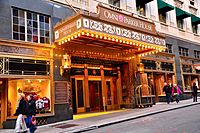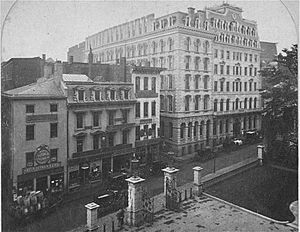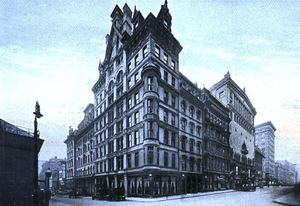Omni Parker House facts for kids
| Omni Parker House Hotel | |
Quick facts for kids  Omni Parker House hotel in October 2010 |
|
| Hotel facts and statistics | |
|---|---|
| Location | Boston, Massachusetts |
| Address | |
| Opening date | 1855 (original hotel), 1927 (current building) |
| Management | Omni Hotels |
| No. of rooms | 551 |
The Omni Parker House is a famous old hotel in Boston, Massachusetts. It first opened its doors in 1855. The building you see today was built in 1927. This hotel is located near the state government building. Because of this, it has always been a popular spot for politicians. The Omni Parker House is part of Historic Hotels of America. This means it's recognized for its important history. It's also listed on the National Register of Historic Places.
Contents
A Look Back at History
The 1800s at the Hotel
The Parker House Hotel was started by Harvey D. Parker. It first opened on October 8, 1855. The hotel quickly became very popular. It even had new parts added just five years later.
A special group called the Saturday Club met here. They gathered once a month to talk about ideas. Famous writers and thinkers were members. These included Ralph Waldo Emerson, Nathaniel Hawthorne, and Henry Wadsworth Longfellow.
The famous writer Charles Dickens stayed at the hotel for five months in 1867–1868. He even performed his story "A Christmas Carol" there. The hotel still keeps the door to his room and a mirror he used. You can see them on display today!
The Parker House also started a new way of charging for rooms. It was called the European Plan. Before this, hotels included meals in the room price. The Parker House only charged for the room. Guests could then buy meals separately whenever they wanted.
In April 1865, actor John Wilkes Booth stayed at the hotel. This was just eight days before he became known for a very sad event. He was in Boston to see his brother.
The hotel grew much bigger between 1866 and 1925. It eventually covered a large area in the city.
The Parker House is famous for inventing some foods. It created Boston Cream Pie, which is now Massachusetts' state dessert. It also invented the Parker House roll. The hotel even made up the word "scrod". This word means the freshest, youngest white fish of the day.
In 1876, composer Jacques Offenbach stayed at the hotel. He was inspired by the rolls. He later used a tune he made up about them in his opera.
When founder Harvey Parker passed away in 1884, he left a lot of money. He gave $100,000 to Boston's new Museum of Fine Arts. This helped start its Print Department.
Later, Joseph Reed Whipple took over the hotel. He wanted the freshest food for his guests. So, he started his own large farm in New Hampshire. This farm supplied the hotel with fresh dairy, pork, and eggs every day.
The 1900s and Beyond
The original hotel building was taken down in the 1920s. A new, modern building was finished in 1927. This is the building that stands today. One part of the old hotel stayed open until the new one was ready. This allowed the hotel to say it was "America's oldest operating hotel."
James Michael Curley was a very popular mayor of Boston. He was often seen at the Parker House. This was because the old City Hall was right across the street. The hotel's bar, The Last Hurrah, is named after a book about Mayor Curley's life.
John F. Kennedy had many important moments at the Parker House. He announced he was running for Congress there in 1946. He also held his bachelor party at the hotel in 1953. Even more, Senator Kennedy proposed to his future wife, Jackie Bouvier, at a table in Parker's Restaurant.
In 1968, Dunfey Hotels bought the Parker House. They later bought Omni Hotels in 1983. The Parker House then became part of the Omni Hotels family. In 1996, a Texas billionaire named Robert Rowling bought the Omni Hotels chain.
The 2000s and Today
The hotel now has 551 rooms and suites. In 2009, AAA called it one of the top 10 historic U.S. hotels. The Omni Parker House is still a proud member of the National Trust for Historic Preservation's Historic Hotels of America program.
Recent Events: The 2024 Strike
In October 2024, some workers at the Omni Parker House went on strike. This was part of a citywide effort to get a new work agreement. On October 20, 2024, the workers voted to approve a new contract. They returned to work the next day. This made Omni the first hotel in Boston to reach an agreement with the union.
Parker's Restaurant: A Culinary History
Parker's Restaurant was actually around before the hotel itself! Harvey D. Parker bought a small cafe in 1832. He renamed it Parker's Restaurant. It quickly became famous for its great food and service. Businessmen and lawyers loved to eat there. In 1854, Parker and his partner bought a mansion. They turned it into the luxury hotel we know today.
Famous Food Inventions
This restaurant is known for inventing several iconic foods. The Boston cream pie and Parker rolls were first made in its kitchens. In 1856, Parker hired a talented French chef named Augustine Anezin. He paid him a very high salary for the time. With Anezin, the restaurant became a top place for fancy dining in Boston.
Chef Anezin is said to have invented the Boston cream pie in 1856. It was first called Chocolate Cream Pie. The original recipe had French touches, like a rum glaze.
In the 1860s, a German baker at the restaurant created Parker House rolls. The story says he threw some unfinished rolls into the oven after an argument. When they came out, they were puffy inside and crispy outside. They had a special folded shape. These rolls became very popular. The official recipe was kept secret for a long time. But in 1933, President Franklin D. Roosevelt asked for them at a White House dinner.
Famous People Who Worked Here
Some well-known people worked at the hotel before they became famous. Malcolm X, who was then called Malcolm Little, worked as a busboy in the 1940s. Chef Emeril Lagasse worked in the Parker kitchens from 1979 to 1981.
Ho Chi Minh also claimed he worked as a baker at the hotel in 1913. However, hotel records don't confirm this.
The Hotel in Books and Music
For over 150 years, the Parker House has appeared in stories and songs.
Some books about ghosts claim that Stephen King's short story 1408 was based on Room 303 of the Parker House. However, King's assistant says this is not true.
In 1877, the humorist Mark Twain stayed in room 168. He told a reporter, "You see for yourself that I'm pretty near heaven—not theologically, of course, but by the hotel standard." This quote inspired the title of a book about the hotel, Heaven, By Hotel Standards.
See also
 In Spanish: Omni Parker House para niños
In Spanish: Omni Parker House para niños
- Harvey D. Parker (1805–1884), the person who founded the Parker House
 | Tommie Smith |
 | Simone Manuel |
 | Shani Davis |
 | Simone Biles |
 | Alice Coachman |




